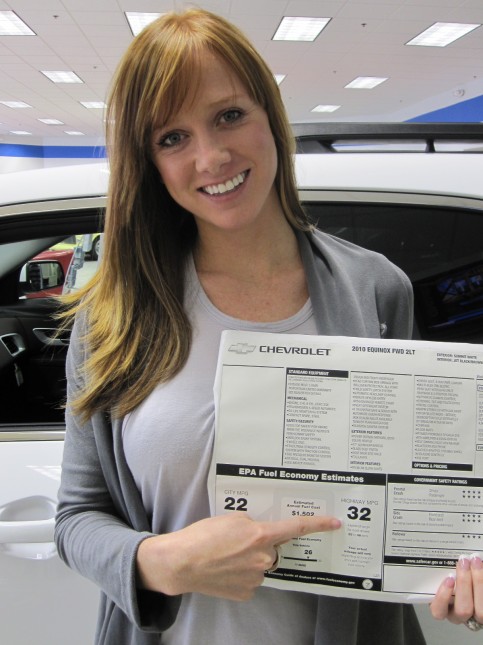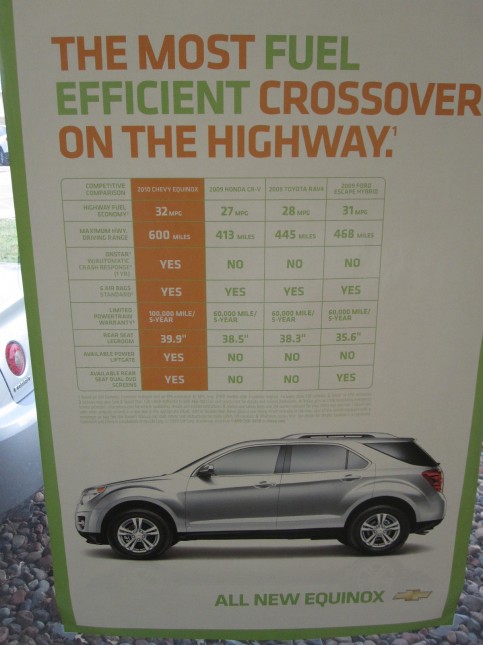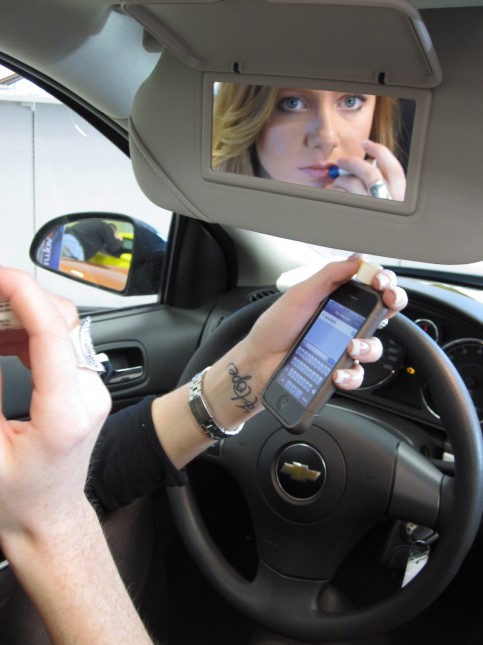
Wow! 32 mpg on an SUV!
With gas prices fluctuating and a hot demand for SUVs and crossover vehicles, fuel efficiency is very important. Whether you drive a monster Silverado Heavy Duty or a petite Hyundai accent, saving is still saving!
Here’s some tips on how to drive more efficiently — and save some money on gas:
- Drive Smart: Heavy accelerating and braking wastes gas so avoid both as much as you can.
- Keep it Clean: Don’t treat your vehicle like an empty closet or suitcase … it’s a car, not a storage device. Excess weight wastes gas cause there’s more to move around.
- Cruise, baby: If you can, use cruise control on the highway — maintaining a steady speed saves on gas.
- Keep tires afloat: Proper tire pressure and inflation is crucial. “Under inflated tires can add 6% to your fuel consumption, which could easily translate into burning an extra gallon of gas with every fill up if you’re getting around 20 MPG.”
- All Oiled-up: Use the recommended oil for your vehicle and and change it when recommended. Clean oil gets better gas mileage than dirty.
Following these simple tips will keep your pocket books full and your significant other happy! For more information on saving gas and choosing the right vehicle for you, check out www.fueleconomy.gov.
Do you have a gas saving tip that you swear by? Let me know in the comments!

most fuel efficient crossover out there





5 Comments
[…] the original post: Tips on fuel efficiency: How can I save on gas? « Lauren Wants To Know Share and […]
[…] Tips on fuel efficiency: How can I save on gas? « Lauren Wants To Know […]
You have the main ideas regarding tips to save by less gas usage. Here are few ideas on how to save money on gas.
1. Car tuneup:
2. Carpool:
3. Buy the cheapest gas: Buy the lowest grade of gas that is suggested in your car owner’s maual.
4. Use the internet to find the cheapest gas in your area. Websites like GasBuddy, and MapQuest.
5. Do not use air conditioning unless it is needed. Use of AC can lower your fuel economy by 10 percent.
6. Fill up when your gas tank is less than quarter tank full and fill up to a full gas tank to avoid making additional trips.
7. Smart driving: Do not make sudden stops or start your engine fast.
8. Consolidate your trips: Avoid making many short trips.
9. Drive lightweight: Do you know mpg decreases as the car engine hauls more weight? Take the unnecessary heavy stuff from your car (don’t forget to check the trunk) and make your car happy.
10. Change out your air filter from stock to performance, such as K&N. There are even better intake hose systems and mods that can be added, (review for reputable mechanic, review auto warranty).
Common myths about saving money on fuel economy.
1. Products claiming to increase as mileage: Read about these “terrific” products on the internet and their reviews before shelling out money. Buy the wrong products and you won’t be saving money on gas.
3. Warm up the car: No need to spend 10 minutes warming up your car on a cold morning, if you are going to be sitting for more than a half minute, you will save more gas by turning the engine off than letting it continue to run.
4. Higher octane gas is better: Not necessarily true. Your driver’s manual will list the recommended level of octane, which will usually be the lowest.
5. Fill up gas in the morning: This myth is based on the science that gas is denser when it is cool out than in the heat of the day. But there is one reason you might want to buy gas in the morning. If you believe gas prices are going to be rising, most gas stations don’t change their daily price until 8 a.m. or so, meaning you still can get the previous day’s price in the early morning.
6. Overinflated tires will save gas: I have read this also has been tested and does save some on fuel efficiency. However, The logic is that if underinflated tires waste gas and properly inflated tires get better mileage because of less tread contact on the road, over inflated tires would have even less tread contact, which would increase mileage. Popular Mechanics tested this theory and found that it didn’t provide any added benefit and that it was dangerous.
Wow!!! These are great! Thank you! I hope this helps!
Maintenace.. Maintenance.. Maintenance…
I still own my 2nd car, a 1990 Honda CRX Si w/276,000 miles. Just recently I encountered a complete failure with my distributor. Who would have expected this after almost 20 years and 270,000+ miles… Anyhow, even modern ignitions require regular maintenance and review. At the first sign of decreased fuel economy, check the very obvious items first (air filter, spark plug condition, plug wire condition, cap & rotor).
While some cars have “coil packs” and thus require less maintenance “supposedly”, just remember that these electrical components are using 10’s of thousands of volts and lots of amperage to make your car run. Any slight failure in an electrical component will be find by the electric current and cause other components to slowly fail.
Also… do not ignore the “idiot” lights. When the check engine light comes on, get the code(s) so you know what the cmoputer is complaining about. Could be something as simple as a loose/bad gas cap. Could be something more like a sensor failing.
In any event, most cars will “usually” start to compensate for the code being thrown by changing some of the computer sensors and how they operate. Like, reducing or increasing the amount of fuel sprayed into the cylinders. Or, adjusting the timing a little (delaying the spark/ignition), etc… Some codes can be fairly easy to fix yourself.
YES… in some cases, you can replace an O2 sensor, or the coil pack, or the plugs. Just get to know your mechanic shop really well. Build a relationship on mutual trust. Don’t take tons of their time, but ask for a little direction. By some of your parts from the dealer, etc.